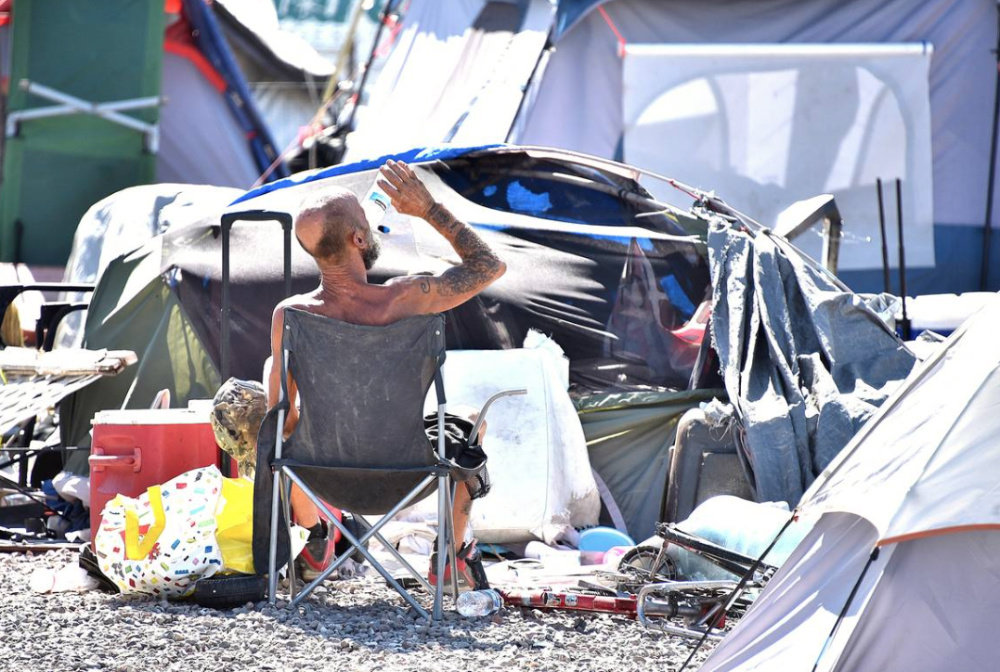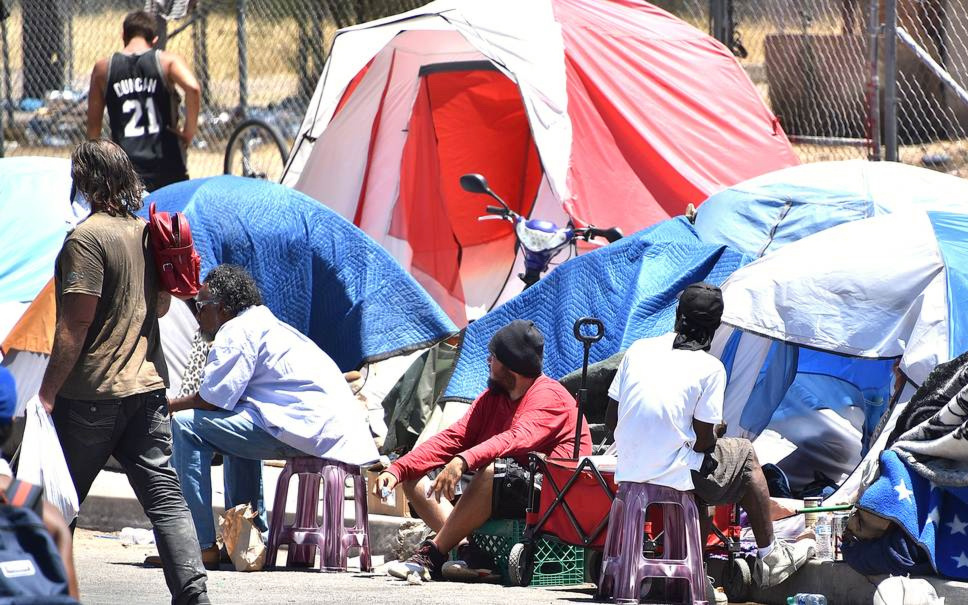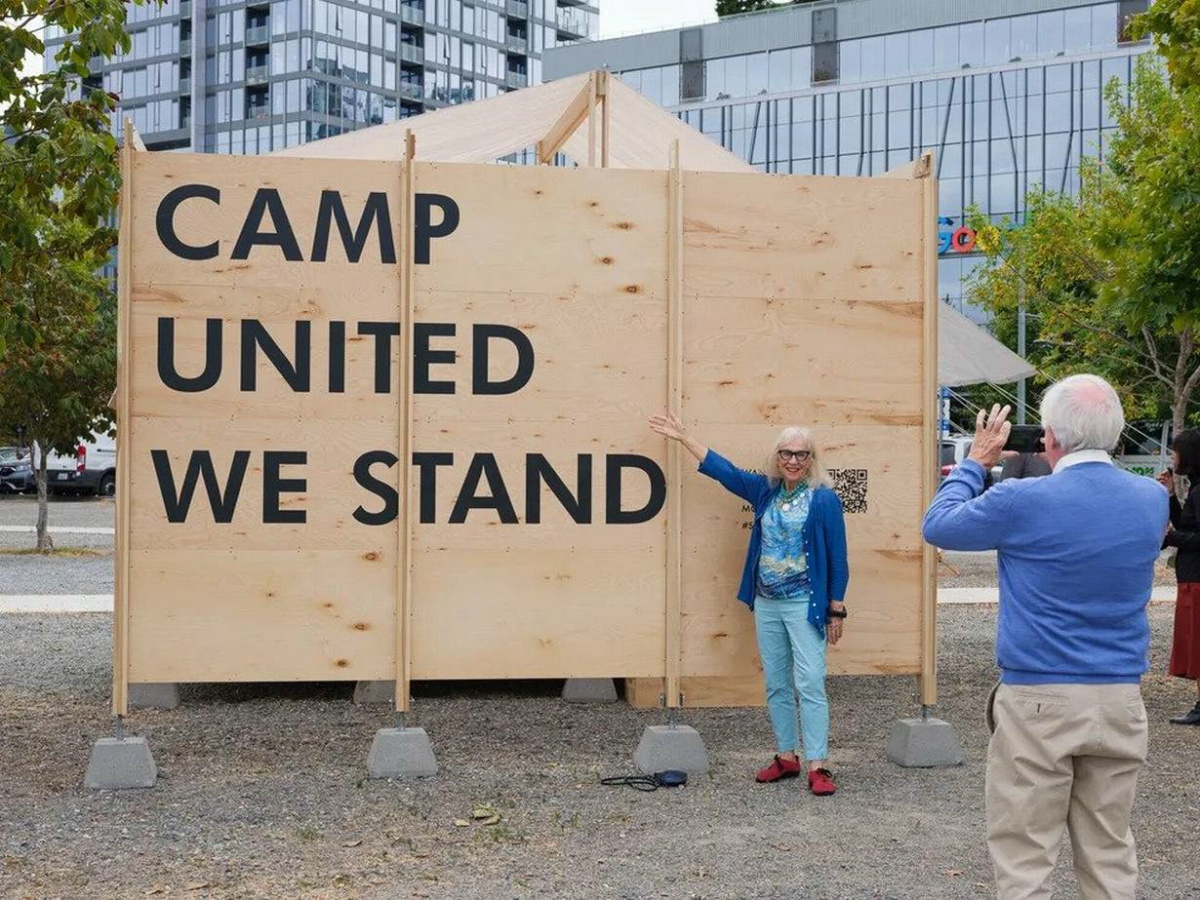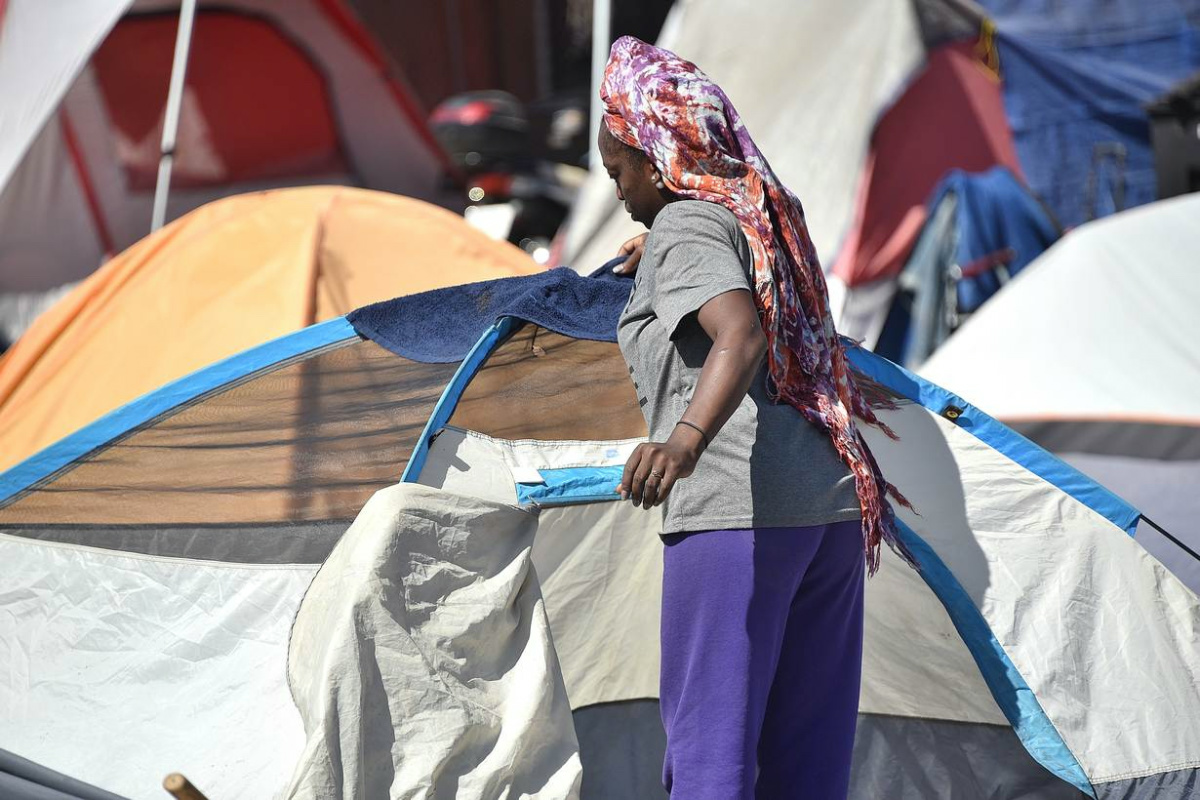
CAREY L BIRON, of Thomson Reuters Foundation, reports on how some US cities tackling a surge of street homelessness are offering official camps while penalising people sleeping in public elsewhere…
Washington DC, US
Thomson Reuters Foundation
As COVID-19 swept across the United States, 63-year-old Elisheyah Denise McKinley lost her home in Phoenix, Arizona – and was told her only option was to put up a tent in a parking lot.
The camp allowed people to pitch tents on two car parks with access to washing areas and toilets, but had few other facilities and became searingly hot as the asphalt baked in temperatures of more than 44 degrees Celsius.
“The ground was so hot, I had to wear combat boots. And there were ants everywhere,” said McKinley, adding that several camp residents had died.
Maricopa County recorded five deaths at the lots over 12 months, four of which were drug-related, said Fields Moseley, communications director for the county.
Alarmed by the deaths, McKinley started looking in on those nearby her and checking if they needed water.
“I started a neighbour check in the mornings,” she told the Thomson Reuters Foundation as she recalled the temporary pandemic-era encampment, which has since been closed.

A man sits at a camp for those experiencing homelessness on county land in Phoenix, Arizona, in summer, 2020. PICTURE: Thomson Reuters Foundation/Steve Carr for the Human Services Campus.
McKinley is among those affected by what has been described as a “crisis of unsheltered homelessness” by the US Interagency Council on Homelessness, which coordinates 19 federal agencies.
The number of people sleeping on the streets climbed to an estimated 226,000 in 2020, a rise of more than 50,000 in five years, said the US Department for Housing and Urban Development.
“They’re being set up as a way to corral, segregate and control unhoused people and concentrate them into a single area so enforcement can occur outside of that area.”
– Tristia Bauman, a senior attorney with the National Homelessness Law Center.
In response, some authorities are setting up legally authorised, “sanctioned” encampments, with supporters saying they are safer than the streets and critics saying they are part of a broader push to criminalise homelessness.
“They’re being set up as a way to corral, segregate and control unhoused people and concentrate them into a single area so enforcement can occur outside of that area,” said Tristia Bauman, a senior attorney with the National Homelessness Law Center.
Authorised camps typically offer basic services such as garbage collection and sanitation, Bauman said, as well as some form of management that can cut down on conflicts with neighbors.
At the same time, a growing number of cities are imposing bans on camping in public, which are used to authorise police “sweeps” to move on homeless people that often destroy their property, said the NHLC.
A new state law in Missouri, versions of which are being debated in Arizona and elsewhere, would help cities set up authorised camps while barring public sleeping or camping on state land outside those areas.
Penalties would include a fine of up to $US5,000 and a month in jail, according to an analysis by The Pew Charitable Trusts, a public policy non-profit.

An unauthorised encampment in Phoenix is seen in this undated handout photo. Via Thomson Reuters Foundation/Steve Carr for the Human Services Campus.
The bills are based on a “model law” developed by thinktank the Cicero Institute that would divert money from shelters and supportive housing to authorised encampments and tiny homes, but also ban sleeping or camping on state land elsewhere.
Backers say the approach is a cost-efficient way to quickly create safe, temporary housing.
“Unsanctioned encampments on the street are the worst place for people to be in modern America. So we think a switch to security, sanitation and potable water is a big step,” said Judge Glock, chief policy officer with the institute.
Former president Donald Trump also backed the concept in a speech on Tuesday last week.
“Create thousands and thousands of high-quality tents, which can be done in one day,” he said.
The US Interagency Council on Homelessness has acknowledged that sanctioned camps can help meet the immediate needs of those on the streets in newly released guidance.
But they should be used only as a “stopgap”, said Jeff Olivet, the agency’s executive director.
“If that’s not tied to a pathway to permanent housing, we need to question the role of those responses,” he said.

People look at a model tiny home at Camp United We Stand, a sanctioned encampment, in Seattle in 2021. PICTURE: Handout photo via Thomson Reuters Foundation/Erik Johnson/Bill Leon.
For some, sanctioned encampments can offer a haven.
In Washington state, Camp United We Stand has been in existence since 2015 after the city of Shoreline, outside Seattle, passed an ordinance allowing encampments to be hosted by local churches for limited periods.
The self-governing camp, capped at 35 residents, charges $US1 a day and includes water, toilets, electricity, garbage service, security, heat in the winter, a kitchen tent and more, said Beverly Hawkins, 65, president of the camp’s board.
“Sanctioned encampments provide a stable, secure place to come back to,” said Hawkins, noting that area shelters cannot accommodate all those experiencing homelessness.
“Sanctioned encampments can be home.”
We rely on our readers to fund Sight's work - become a financial supporter today!
For more information, head to our Subscriber's page.
Many street sleepers would rather have the choice of using official camps, said Jordan Steelman, who works with the anti-homelessness group Love Huntsville in Huntsville, Alabama.
The city has shut down seven unofficial encampments over the past year, even as homelessness numbers have risen, he said.
“What we’ve been asking for is simply allowing people to camp safely…without being harassed by law enforcement,” said Tia Turner, president of Love Huntsville.
The city of Huntsville did not respond to requests for comment.

A resident at a camp for those experiencing homelessness on county land in Phoenix, Arizona, in summer 2020. PICTURE: Handout photo via Thomson Reuters Foundation/Steve Carr for the Human Services Campus
Back in Phoenix, the city has seen a tripling of its unsheltered population amid the pandemic, said Amy Schwabenlender, executive director of the Human Services Campus, a consortium of anti-homelessness groups that helped operate the official outdoor camps.
Officials closed the temporary pandemic-era encampment in 2021 and have since sought to cordon off public land to discourage camping.
But 1,000 people have set up tents in a blocks-long unauthorised encampment around the campus, said Schwabenlender.
“Campgrounds are not adequate shelter and do not provide a truly safe, healthy and secure environment,” Kristin Couturier, a senior public information officer for the city, said in an email.
“Our urgent priority is identifying indoor spaces.”
Schwabenlender said that she heard from temporary camp residents who believed the encampments were a useful resource during the pandemic – but that they should not be re-opened, and failed to offer a long-term solution.
“It would be sanctioning people to live permanently in public spaces,” she said.
“That’s not what anyone wants. It’s not good for neighbourhoods, it’s not good for health, and it doesn’t look like America, where we have enough resources to help everyone have housing.”
A year after she moved out of the camp and still struggling to find a permanent home, McKinley agreed.
“They’re not better than nothing,” she said.





